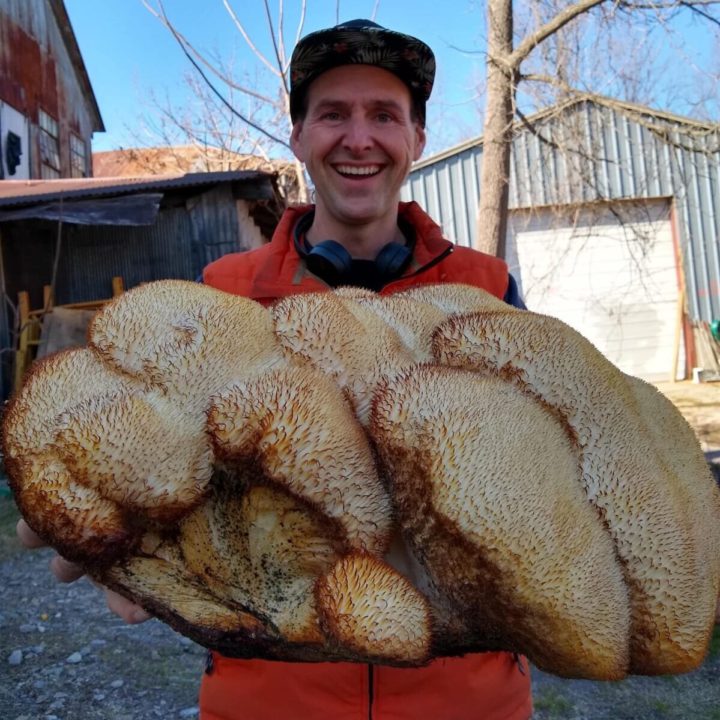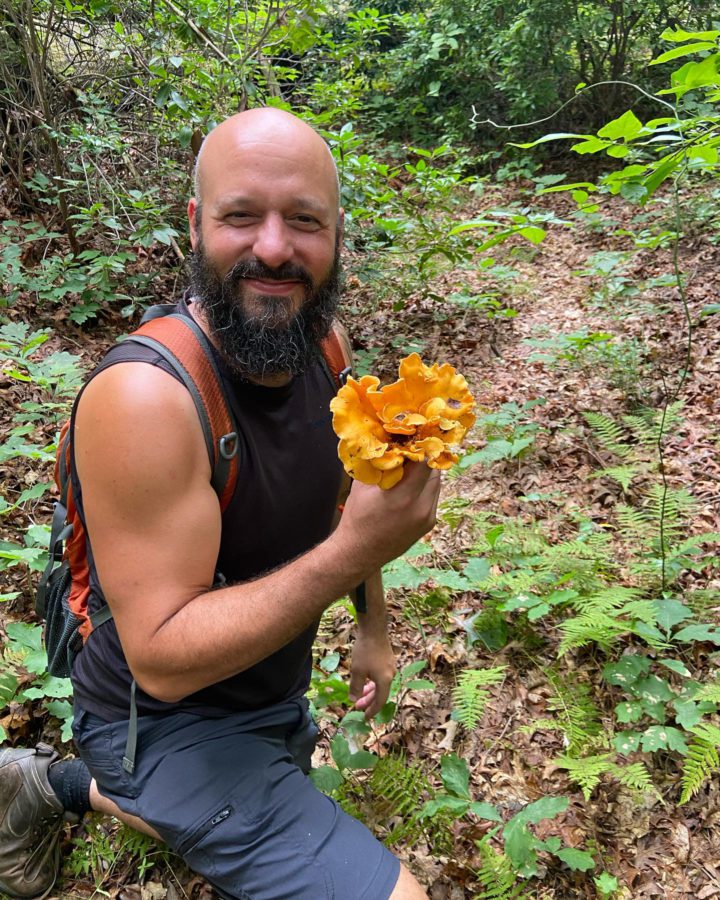Asheville’s wellness culture is touted nationwide for its outdoor lifestyle and fresh mountain air. But less well known are the mycological wellness opportunities — that is, medicinal mushrooms — in our refrigerators and cupboards.
Numerous shops, cafes and farms in Western North Carolina sell medicinal mushroom products, including tinctures, gummies, teas and skin care. Some purveyors forage their own mushrooms, while others sell products with mushrooms sourced in the region.
Fungi have a long history in traditional Chinese medicine. However, not everyone automatically embraces the idea of mushrooms as medicine, and educating customers about edible mushroom varieties, their medicinal uses and safety is a big part of the job for those who sell these products. “I find it interesting that some people can get poisoned by bad chicken, and you don’t hear anything about it, but if somebody in Australia gets poisoned by a mushroom, you hear about it across the world,” says Christopher Parker, co-owner of The Forest Farmacy in Marshall.
Mushrooms also have another reputation to contend with. “The No. 1 question is ‘Are these psychedelic?’” says Taylon Breeden, co-owner of The Pot Stirred, a mushroom cafe in the River Arts District. “They aren’t psychedelic, but they are medicinal.” Mushrooms containing psilocybin, a psychedelic, have also been used for the treatment of depression and other mental health issues, but it’s illegal to sell them.
All mushrooms are a good source of vitamins and minerals, but proponents of medicinal mushrooms cite their adaptogens in particular as beneficial. According to the Cleveland Clinic, a nonprofit academic medical center, adaptogens are “active ingredients in certain plants and mushrooms that may impact how your body deals with stress, anxiety and fatigue.”
Tinctures and gummies
Tinctures, extracts and gummies are common ways to reap the benefits of medicinal mushrooms.
“A lot of people are apprehensive of mushrooms because they think the taste is going to be weird,” says Tarleton Walmsley, co-owner of Garden Party, a West Asheville boutique for CBD and cannabis-adjacent products. She says that hasn’t been an issue with the Mushroom Magic tincture from Wooden Spoon Herbs, a brand she sells at her shop. It contains shiitake, maitake (also known as hen of the woods), chaga, reishi, cordyceps and lion’s mane, flavored with cinnamon bark and vanilla bean.

Garden Party also sells a Fungi Buzz gummy from Nice Hemp Co., which is a cold-brew-coffee flavored gummy dusted in maple syrup. It contains ingredients from 10 types of mushrooms. The gummy also contains delta-9 THC, which can have an intoxicating effect, and CBG, which Walmsley describes as “the mother cannabinoid — the place in the [cannabis] plant where CBD and THC are bred.”
In the past five years, Garden Party customers have primarily sought nonaddictive aids for sleep, Walmsley says. But more recently, they’re also seeking nonaddictive help with focus, which explains why interest in medicinal mushroom products has risen at the shop.
Franny’s Farmacy, which has two locations in Asheville, one in Hendersonville and one in Hickory, sells numerous medicinal mushroom gummies and extract capsules. Its Chill Out Gummies contain reishi mushrooms and L-theanine, an amino acid that supports relaxation, according to Healthline. Rise Up Gummies have chaga and lion’s mane mushrooms in them, which the website claims boost energy. Among Franny’s Farmacy’s extract capsules are one made from lion’s mane, which the website says helps with focus, and another containing seven mushroom varieties: turkey tail, amanita, cordyceps, reishi, chaga, lion’s mane and shiitake.
Rejuvenating beverage
Risottos, pasta sauces and veggie burgers are popular ways to enjoy mushrooms. But at The Pot Stirred, it’s possible to drink mushrooms.
The vanilla mushroom latte is a best seller, says Breeden, who recently moved the cafe from downtown Asheville to Canopy Gallery in Art Garden AVL. The beverage contains PennyCup espresso or a chaga brew, milk, simple syrup and cordyceps and lion’s mane mushrooms.
Breeden believes the latte is popular because it’s the most similar to regular coffee drinks. Coffee is a good way to normalize consuming medicinal mushrooms, she says, because java drinkers already know how caffeine feels, and the energizing effect from chaga or cordyceps could feel familiar enough to be unthreatening.
The Pot Stirred also sells Mood Boost capsules, which Breeden says are a top seller. The Mood Boost Moon Shrooms capsules contain CBG and lion’s mane, which Breeden says has personally helped her with “mental fog.”
All the mushrooms used at the cafe are locally grown or foraged, she adds, citing Blue Ridge Chaga Connection as a main supplier. They are added to beverages either dried or as tinctures in the cafe’s simple syrups.
Grow local
Local interest in horticulture, growing one’s own food and nonpharmaceutical health care are surely reasons that shops selling fungi have captured a market in WNC. But ecology is another big reason: Mushrooms generally grow well in damp, humid conditions with shade or darkness, creating an abundance of product here.

Parker, who operates The Forest Farmacy, grows mushrooms and has been foraging for at least 20 years. He doesn’t have a brick-and-mortar shop but sells his mushrooms, tinctures and extracts at the West Asheville Tailgate Market on Tuesdays and the Asheville City Market on Saturdays. (Individuals can forage for mushrooms for their own usage. However, a license is required in North Carolina to harvest wild mushrooms for resale at restaurants, co-ops or catering services.)
Parker’s extracts are the result of an eight-week process, first in an alcohol tincture and then in water extraction. As a mushroom grower, he’s able to produce the extracts at a volume that may not make sense for individuals. He estimates 5 or 6 pounds of dried lion’s mane mushrooms create about a gallon and a half of liquid in the double extraction process.
Through his business, Parker also teaches classes on medicinal mushrooms and their cultivation. He’s currently writing a book on medicinal mushrooms, and he promises it will contain a few recipes.
Kevin Krzyzaniak of Blue Ridge Chaga Connection began foraging wild mushrooms upon his arrival in WNC 16 years ago. “When I started learning the medicinal benefits, I figured a lot of them could help me and help people I know,” he says.
He sells dried mushrooms and tinctures, chaga and lion’s mane tea bags, soap and a shea butter skin rub made from chaga extract. He says lion’s mane has always been popular, and currently a “brain blend” of lion’s mane, cordyceps and maitake is selling well because it encourages alertness, he says.
Krzyzaniak leads foraging hikes, and he says he forages nearly every day. “The hunt is childish fun,” he says. And he also loves educating others about mushrooms. “I love to see people lit up by their first mushroom find. … Just opening that door, that world of mushrooms, to people is fascinating.”




Before you comment
The comments section is here to provide a platform for civil dialogue on the issues we face together as a local community. Xpress is committed to offering this platform for all voices, but when the tone of the discussion gets nasty or strays off topic, we believe many people choose not to participate. Xpress editors are determined to moderate comments to ensure a constructive interchange is maintained. All comments judged not to be in keeping with the spirit of civil discourse will be removed and repeat violators will be banned. See here for our terms of service. Thank you for being part of this effort to promote respectful discussion.